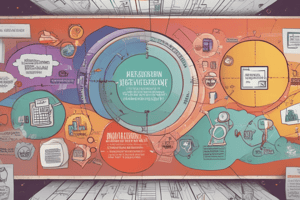Podcast
Questions and Answers
¿Cuál es el objetivo principal del Taylorismo?
¿Cuál es el objetivo principal del Taylorismo?
- Aumentar la eficiencia en los procesos laborales (correct)
- Establecer líneas de autoridad claras en la organización
- Imponer reglas formales en la burocracia
- Analizar las relaciones humanas en el trabajo
¿Cuál teoría administrativa se enfocó en la estructura y organización de las burocracias?
¿Cuál teoría administrativa se enfocó en la estructura y organización de las burocracias?
- Teoría Contemporánea
- Teoría de las Relaciones Humanas
- Teoría Clásica (correct)
- Taylorismo
¿Quién desarrolló el Taylorismo en el siglo XX?
¿Quién desarrolló el Taylorismo en el siglo XX?
- Elton Mayo
- Frederick W. Taylor (correct)
- Max Weber
- Henri Fayol
¿Cuál de las siguientes teorías administrativas NO se menciona en el texto?
¿Cuál de las siguientes teorías administrativas NO se menciona en el texto?
¿Cuál es el propósito principal de las teorías administrativas?
¿Cuál es el propósito principal de las teorías administrativas?
¿Cuál teoría administrativa se enfoca en la eficiencia y la optimización de los procesos?
¿Cuál teoría administrativa se enfoca en la eficiencia y la optimización de los procesos?
¿Qué teoría administrativa se caracteriza por su enfoque en la estructura y la jerarquía en las organizaciones?
¿Qué teoría administrativa se caracteriza por su enfoque en la estructura y la jerarquía en las organizaciones?
¿Cuál teoría administrativa se centra en la importancia de la comprensión de los aspectos sociales y psicológicos de la vida organizativa?
¿Cuál teoría administrativa se centra en la importancia de la comprensión de los aspectos sociales y psicológicos de la vida organizativa?
¿Qué teoría administrativa se enfoca en la adaptabilidad y la mejora continua en un entorno en constante cambio?
¿Qué teoría administrativa se enfoca en la adaptabilidad y la mejora continua en un entorno en constante cambio?
¿Cuál es el nombre del sociólogo alemán que dio nombre a la Teoría de la Burocracia?
¿Cuál es el nombre del sociólogo alemán que dio nombre a la Teoría de la Burocracia?
Flashcards are hidden until you start studying
Study Notes
Administrative theories have played a significant role in shaping the way organizations are managed and governed. These theories provide frameworks for understanding the complexities of organizational life and offer guidance on how to improve organizational efficiency, effectiveness, and adaptability. In this article, we will discuss Taylorismo, Teoría Clásica, Teoría de las Relaciones Humanas, Teoría de la Burocracia, and Teoría Contemporánea, which are some of the most prominent administrative theories.
Taylorismo
Taylorismo, also known as scientific management, was developed by Frederick W. Taylor in the late 19th and early 20th centuries. The goal of Taylorism was to increase efficiency in work processes by breaking down tasks into their most basic components and studying the most efficient ways to perform each task. Taylor believed that by applying the principles of science to management, organizations could achieve significant improvements in productivity.
Teoría Clásica
Classical administrative theory, which emerged in the first half of the 20th century, was primarily concerned with the structure and organization of bureaucracies. This theory emphasized the need for clear lines of authority, formal rules, and efficient procedures to ensure that organizations functioned effectively and efficiently.
Teoría de las Relaciones Humanas
Human relations theory, also known as the "new" administrative theory, emerged in the mid-20th century as a response to the rigidity and inflexibility of classical administrative theory. This theory focused on the importance of understanding the social and psychological aspects of organizational life, emphasizing the need for leadership, motivation, and teamwork to create a more humane and effective work environment.
Teoría de la Burocracia
Bureaucratic theory, which is also known as Weberian theory, is named after the German sociologist Max Weber. Weber's work focused on the need for a clear division of labor, a hierarchy of authority, and impersonal relationships in organizations. This theory emphasizes the importance of maintaining a strict separation between an organization's formal structure and its informal social relationships.
Teoría Contemporánea
Contemporary administrative theory is characterized by its focus on the evolving nature of organizational life and the need for adaptability in a rapidly changing environment. This theory emphasizes the importance of continuous improvement, learning, and innovation in organizational processes and structures.
In conclusion, administrative theories have been instrumental in shaping our understanding of organizational management and governance. From Taylorism's focus on efficiency to classical administrative theory's emphasis on structure, human relations theory's recognition of the social and psychological aspects of work, bureaucratic theory's emphasis on formal structure, and contemporary administrative theory's focus on adaptability, these theories have provided valuable insights into the complexities of organizational life. As organizations continue to evolve and adapt to changing circumstances, administrative theories will continue to play a vital role in guiding their development.
Studying That Suits You
Use AI to generate personalized quizzes and flashcards to suit your learning preferences.



